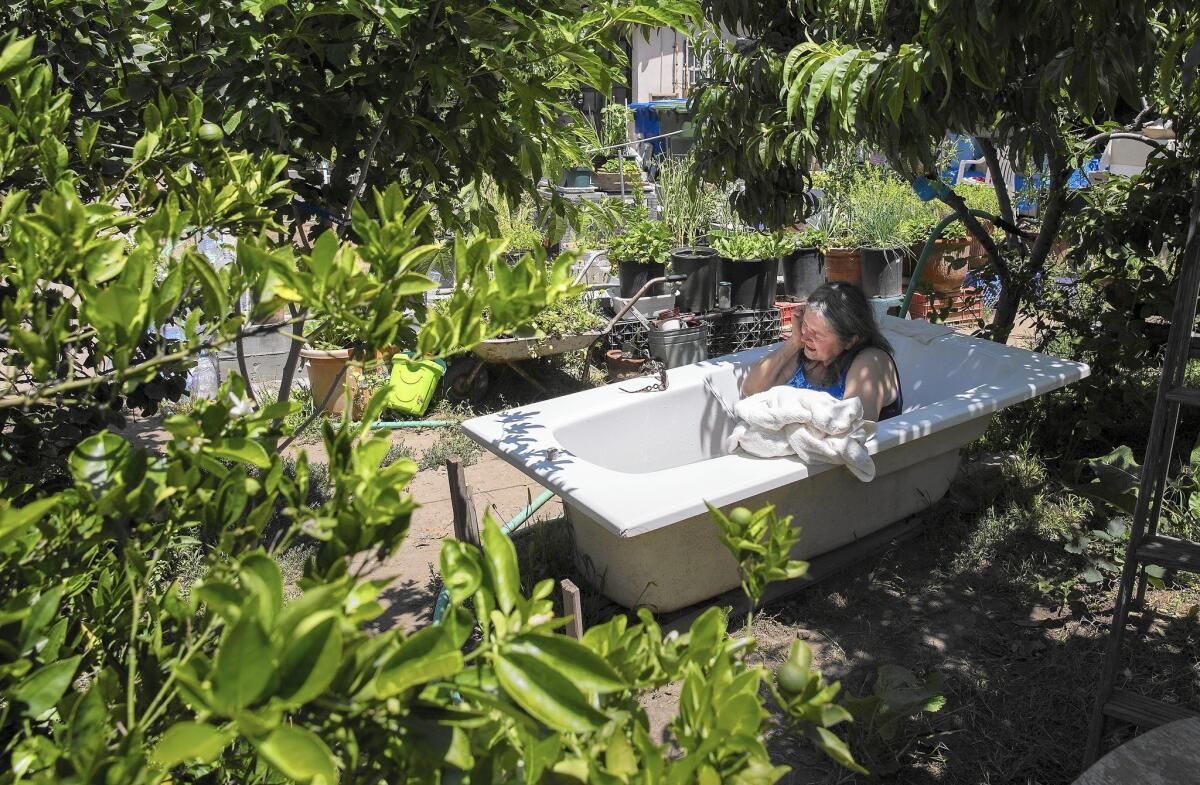Column: Three stories of hardship put a face on L.A.’s exorbitant housing costs

Agneta Dobos, 67, bathes in an outdoor tub on her property in Tujunga.
- Share via
In Reseda, an elderly couple fret about where they will go at the end of the month, when they are forced out of the one-room apartment they have lived in for 29 years.
In Tujunga, a retired woman lives in a backyard shed, treating her high blood pressure with tea made from her garden and bathing in an outdoor tub with water heated by the sun.
In Arleta, a supermarket employee rents a makeshift room in a house that is home to 10 people, and often waits in a long line to shower before work.
I didn’t set out last Wednesday to tie these stories together; I was following leads in search of the small dramas that play out daily, beyond the headlines, in homes that do not make the Hot Property column.
I traveled the 101 and the 405, the 118 and the 210, and the stories intersected as the highways do, here in a land where all too often plans fall apart, and the daily challenge is to adapt, to endure, to survive.
::
“Help!!!!” Caroline Malloy pleaded in an email to me.
Her parents, Charles and Bernice Malloy, 80 and 70, are being evicted from the Reseda retirement home they moved into in 1986.
“At the end of last year, the owner called me and said, ‘We’d like you to move out,’ ” says Bernice. “I was just speechless.”
Bernice worked for the retirement home as a live-in receptionist and medication technician, among other jobs, and in return she got a modest paycheck and the studio was rent-free. She pressed for an explanation and was told her job was being eliminated, and the room went with the job, so she was out.
“This is our life,” Bernice said, showing me her modest setup at the Ambassador Garden on Canby Avenue. Their one-room home has no kitchen, which has made for three decades of cooking challenges, and a clothes rack serves as a room divider.
A wooden LOVE carving is perched atop a curtain rod and a shelf displays a greeting card with pink butterflies and the words: “To My Beautiful Wife. You’re a Gift From God.”
The card is from Chuck, a former U.S. Marine who now steadies himself with a walker. His wife and daughter — that’s Caroline — confide that he’s in the early stages of dementia.
Chuck worked as a delivery man back in the day, but neither he nor Bernice ever brought home a big paycheck, and medical expenses have taken a bite out of their limited funds.
So what are their options in one of the most expensive real estate markets in the country, with scant affordable housing and waiting lists for subsidized senior living?
“They have to come live with me,” said Caroline, 40. “I’m an only child and they’re my only parents, and I can’t let them go somewhere else.”
Caroline’s rent-controlled studio apartment is no bigger than her parents’. She lost her job as a bookkeeper when the recession hit and the new job she found pays less. And still, she notes with pride, she’s never missed a rent payment — and is fully confident that she can afford the rent on a larger apartment in the building.
So it really ticks her off that the management at Talavera Apartments in Reseda first insisted that she include her parents on the application for the new apartment — and then summarily rejected the family because her parents’ credit rating isn’t high enough.
“So what?” asked the Malloys’ attorney, Robin Paley. “Can’t they make an exception?”
I suggested that Caroline combine her salary with her parents’ retirement income and move into a bigger unit somewhere else, but she said market rates are exorbitant, and having once lost a job, she fears being stretched too thin.
Her apartment managers did not return my calls, and my conversation with the manager of the Ambassador Garden was brief. He said only that Mrs. Malloy’s job was being eliminated and that I should call back next week because he was on a beach in Mexico. Then he hung up.
On July 1, barring any developments, Caroline Malloy and her parents will begin living together in an apartment the size of the average garage — an arrangement not at all uncommon in Los Angeles.
::
I drove high into the hills of Tujunga, stood at a locked gate on a country road and called out to Agneta Dobos. She didn’t answer.
I heard the trickle of water, peered through the vegetation, and saw a woman in a bathtub under a peach tree.
Long ago I stopped being surprised by the way people live in Los Angeles.
Some make do in cars for years on end.
Some live in converted garages.
Some wedge themselves under freeway overpasses.
And I have just gotten to know a woman who went nine months without running water in her home.
Still, an outdoor bathtub was new to me.
“I bought it for $40,” Dobos told me, opening the gate with a towel on her head when she realized I was not there to evict her.
Dobos has been at this property for 27 years, and the 1994 Northridge quake damaged her house. Years later, she signed a deal with the city to have the house demolished and rebuilt with a HUD loan, but that plan fell apart in disputes between Dobos, the contractor and the city.
So she moved into a backyard shed eight years ago to await a resolution that never came, and now the city is evicting her because the shed doesn’t meet safety standards.
“They’re going to put me in the street and I’m going to die,” said Dobos, 67, a former registered nurse who said she has heart trouble and multiple other health problems.
The shed she lives in is about 8 feet by 10 feet, with a portable grill and toaster oven powered by a line that runs from the street. There is no toilet; she goes to the nearby YWCA. The only place for a small table is on the bed, and she slides her feet under it when she sleeps.
To heat the water for her daily bath, Dobos fills about two dozen plastic jugs from a garden hose and sets the jugs on the foundation of the house that was never built. About 2 p.m., she dumps the sun-heated water into the tub and climbs in.
It’s a hard life, but she loves the home she shares with her cats and three chickens, who lay green eggs. During those spells when she can’t afford to shop, she eats her own tomatoes, walnuts, apricots, grapes and oranges. When her blood pressure rises or her diabetes flares up, she brews teas from her loquats, celery leaves and nopales.
Dobos seems to have a history of disagreement with neighbors, employers and inspectors.
I can’t believe, though, that the best solution is to force her onto the street, adding her to the 44,000 homeless people countywide who have set up tents and built “cardboard condos” almost everywhere, including within blocks of City Hall.
Maybe, rather than evict her, the city could arrange for a social worker to help resolve her problems and upgrade the shed to make it safe for her to live in — and then restart the rebuilding of her house.
::
It took 20 minutes to drive from Tujunga to Arleta, where I met with Reina Rosales at a one-story home that serves as a kind of hostel for people who work low-wage jobs.
Rosales’ room at the back of the house is a wooden, corner-cutting add-on, and she has to walk out of her unit and back into the house to use the one bathroom shared by nine renters. The owner keeps one bathroom to himself.
“If I’m scheduled to start at 7, I have to get up at 5 in the morning because the bathroom is very busy,” Rosales said.
She used to have a better place, but the rent was too high at $600 a month. This one goes for $350.
The 48-year-old works in the deli at an El Super grocery. The chain offers rock-bottom prices to a mostly Latino clientele. This week, peaches are 79 cents a pound, tilapia is $1.47 a pound, and a 24-ounce bottle of Hunt’s ketchup is 99 cents. It’s a business model that elevated the owner of the Mexico-based company into the ranks of the world’s billionaires in 2013.
“It’s off the backs of the workers,” said Rosales, who makes less than $10 an hour, which is significantly less than wages at many supermarket chains.
She had to work last Wednesday, so she was unable to join hundreds of El Super employees who marched in Highland Park demanding better pay and benefits. And even with the new minimum wage increase approved by Los Angeles city officials, Rosales has to wait until July 2016 for a bump to $10.50 an hour.
Rosales sends as much of each paycheck as she can to her family in El Salvador for education and basic needs. What’s left is just enough for food, bus fare and the little room with a mattress on the floor and photos of her family on a dresser.
She said she sticks to herself in the house, watches movies in English to improve her language skills and dreams of one day going to college.
“I need to find a better job, and opportunities don’t just come to you,” Rosales said. “You have to look for them.”
::
Last week, the California Supreme Court cited an affordable housing shortage of “epic proportions” and issued a ruling that makes it easier for municipalities to require developers to sell some housing at below-market rates.
Los Angeles Mayor Eric Garcetti applauded the ruling, but he needs to do more than clap. He needs to lead the way on a plan to make it happen.
Raising the bottom on minimum-wage jobs is a nice boost, but that’s the easy part. The bigger challenge is the creation of middle-wage jobs.
The striking thing about the stories I have told today is that they are not exceptional.
Thousands of people in our city live in circumstances that are equally challenging.
What’s depressing is that we, as a city and county, are so inept at helping them.
What’s inspiring is witnessing how the Malloys, and Agneta Doboses, and Reina Rosaleses adapt, endure and survive, their dignity intact.
MORE FROM STEVE LOPEZ:
DWP cancels couple’s $51,269.42 water bill, gives $85 credit
At 50 gallons a week, widow knows just how precious water is
Why throw money at defense when everything is falling down around us?
More to Read
Sign up for Essential California
The most important California stories and recommendations in your inbox every morning.
You may occasionally receive promotional content from the Los Angeles Times.











